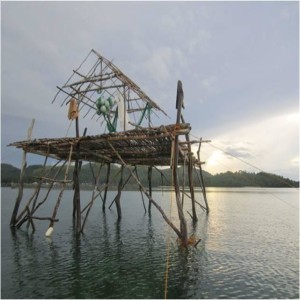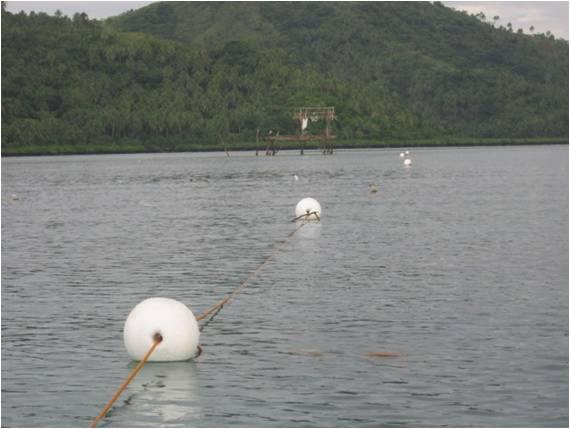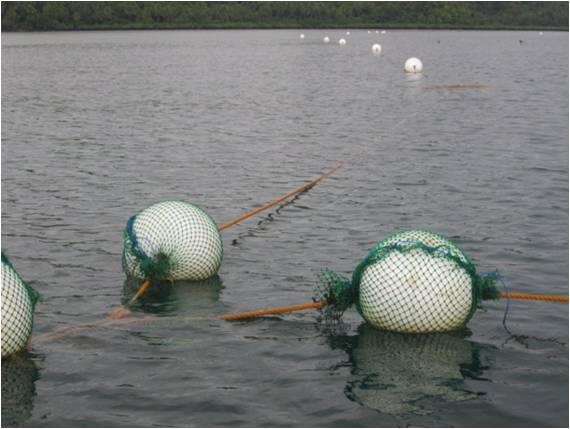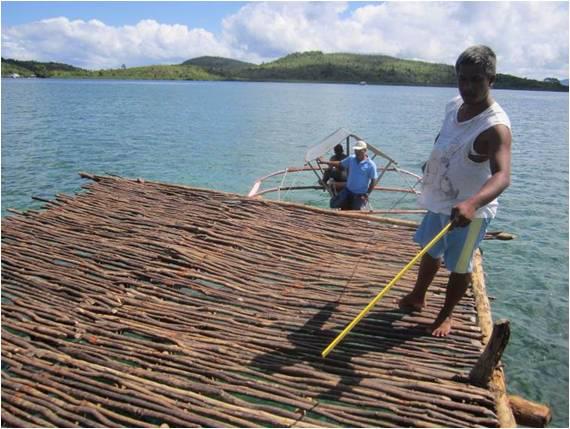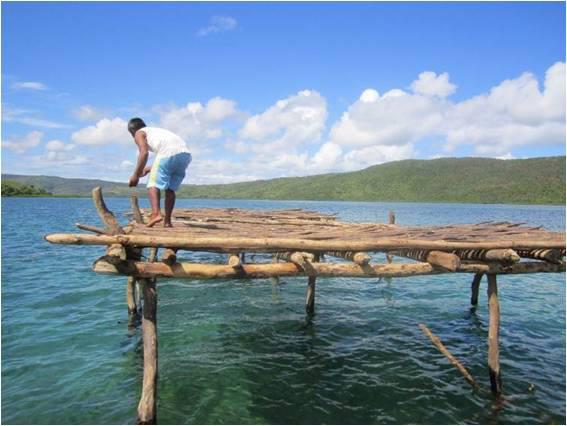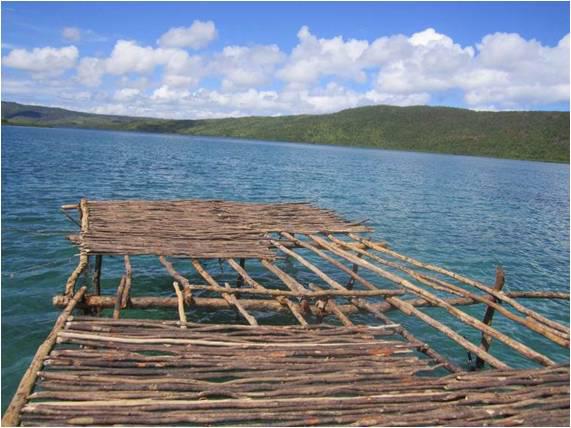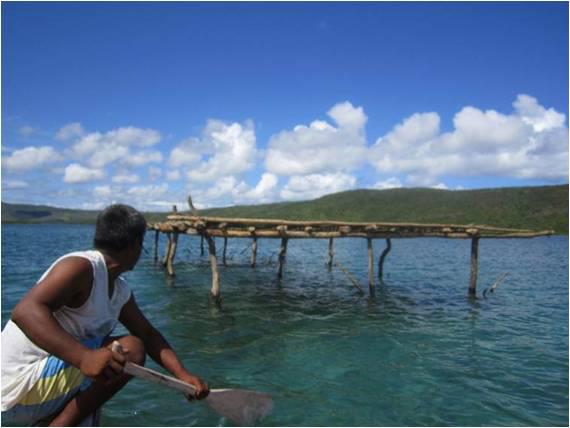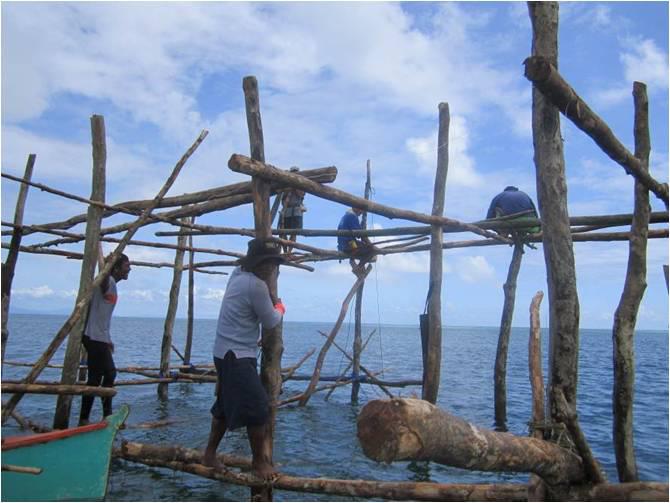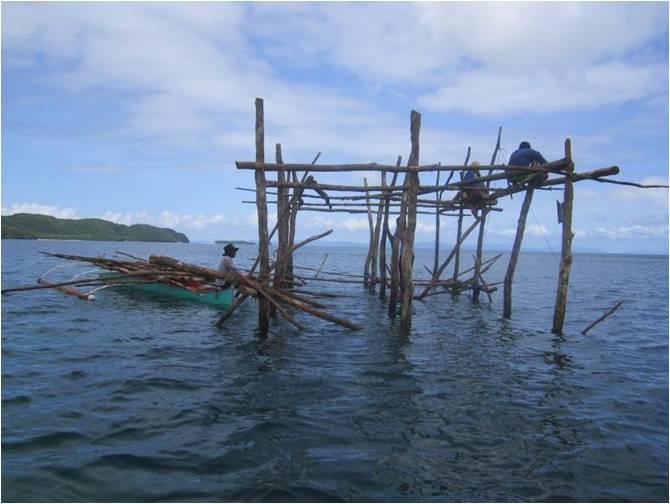Author Archives: pdap
SULTAN OF MUSCOVADO share
SULTAN KUDARAT MUSCOVADO FARMERS AND MILLERS CORP.
As the global economy emerges from its worst downturn since the Great Depression in the United States of the 1930s, expectations are high that commodity prices would spike starting 2010 as buyers around the world scramble for precious supply.
Sugar will not be an exemption. This may thus be an opportunity for local producers of muscovado to earn more from increased prices, given the rising demand for this raw, healthy sugar that is finding a growing and loyal market in developed countries, particularly in Europe.
And when it comes to muscovado, the Sultan Kudarat Muscovado Farmers and Millers Corp. (SKMFMC) is an expert.
Legally registered as a corporation in March 2006, SKMFMC is a social enterprise made up of two farmers’ cooperatives, eight individual millers and several farmers. It is based in President Quirino, a 3rd class and considered the most depressed municipality in the province of Sultan Kudarat.
Around 890 hectares are planted to sugarcane making President Quirino the largest producer of muscovado (dark brown unrefied sugar) in the country in terms of land area coverage. National muscovado production, aside from its being seasonal, has been declining due mainly to crude processing technology, improper production technology, lack of good sugarcane varieties and land conversion.
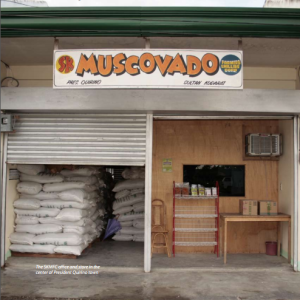 Under PRIME, PDAP identifid the need to fist shift small farmers from producing conventional sugar to muscuvado. The second shift was from inorganic farming to sustainable agriculture and addressing the problem of production shortage.
Under PRIME, PDAP identifid the need to fist shift small farmers from producing conventional sugar to muscuvado. The second shift was from inorganic farming to sustainable agriculture and addressing the problem of production shortage.
“PDAP had a hard time organizing us. The people said, ‘you just cause a disturbance’.” Farmers’ attitudes differ. We had to do it slowly,” relates SKMFMC chair Cornelio Castaneda, himself a small muscovado miller.
SKMFMC and PDAP realized that despite the farmers’ appreciation of the situation and expressed interest in organic farming – due to lack of market information and the behavioral hesitance to change what they have been used to – there had to be an investment on capacity building, and more so, on institution building.
With the facilitation of PDAP, the Philippine Business for Social Progress’ Business Advisory Program (PBSP-BAP), trained the farmers on organizational anagement, and now enjoy clearer direction and objectives. PDAP provided technical assistance for the use of financial software for SKMFMC to generate timely reports as an aid to decision-making.
While these took time, farmers started seeing incremental changes, and though these were small, they were necessary. “They saw that the villages producing organic muscovado had several variety stores, and these are open all-year round compared to the stores in nearby villages which close after harvest,” Castaneda says.
Working with the Asia-Japan Partnership Network for Poverty Reduction (AJPN), PDAP concentrated on catalyzing the third shift – consolidating the small farmers and millers into a corporate entity. This last hurdle was the most diffilt. It is one thing to organize farmers and shift them to organic farming, it was yet another to turn them into entrepreneurs.
After drafting their business plan with technical assistance from PDAP, SKMFMC received a working capital loan worth P1.6 million from PDAP’s partner fiancing institution, FPSDC – the payment of which it has religiously worked for.
PDAP also linked the group with Upland Marketing Foundation, Inc. (UMFI), an NGO based in Metro Manila providing marketing support services for communities for their processed food products.
PDAP assisted in its compliance with the Good Manufacturing Practices as well as the Hazard Analysis and Critical Control Point as food safety requirements of the Food and Drugs Administration (FDA) and the Department of Health (DOH). PDAP also helped in the product’s packaging.
Other agencies also provided invaluable assistance to SKMFMC. The Department of Trade and Industry (DTI) helped in the branding. The Department of Science and Technology (DOST) is also helping SKMFMC, which until now still manually packages its products, set-up its packaging machine.
SKMFMC also worked on the documentation, inspection and evaluation of its ICQS (Internal Quality Control System) to assess the group’s readiness for local and international organic certification.
Now there are only two kinds of musvocado – what is called the “PDAP quality” and “reject quality.”
“We have set our own standards that require our muscovado to be sediment-free. It is already export quality. The proper term here is premium muscovado,” says Castaneda.
And with SKMFMC’s Memorandum of Agreement (MOA) with four Rural Enterprising Communities (RECS), the volume of musvocado has steadily increased. The group’s positioning the product as “premium” and the parallel increase in quality allowed SKMFMC to command a good price for the farmers, and prevent fluctuation.
“Before PDAP, farmgate price ranged from P12.00 to P14.00 per kilo,” recalls Castaneda, “now, it doesn’t get any lower than P40.00 to P45.00 per kilo.”
The demand that has always been there escalated.
Between that and UMFI’s requirement that sometimes reaches up to 60 tons, the industry in Sultan Kudarat had to respond to a market vacuum and pole vaulting – market trends that farmers have not had any experience dealing with.
SKMFMC admits to a struggle that required it to be creative in its engagement. Since the group has successfully increased the price of musvocado, other farmers and millers who are nonmembers have also ridden the wave.
Castaneda explains the phenomenon, “They cannot lower their prices from our P40.00 to P45.00 buying price. There is a market vacuum because of the huge demand so some farmers sell outside for P32.00. All we can do is keep improving our quality so they will see the difference.”
The market vacuum also created complacency among the farmers, even some members of SKMFMC, and the level of quality went down. “They say, we can sell this anyway, even the dirty muscovado is bought. So why should we risk it? Why should we make a loan? SKMFMC, they said, is too strict.”
But Castaneda is steadfast, “We started it right, we will end it right. Even if we don’t want to offend anybody, we need to do this for the good of the industry.”
SKMFMC will have to make sure that those standards stay, especially as the Philippines faces the very real possibility of imported muscovado coming into the country starting next year with the lowering of global tariff.
The Philippines’ muscovado, fortunately, can still compete with imports and can even be priced competitively to penetrate more markets abroad. And when it does, it is almost sure that SKMFMC will be in the picture.
Seaweed and Bangus Culture for Rural Households in Typhoon Yolanda-affected areas in Western Samar share
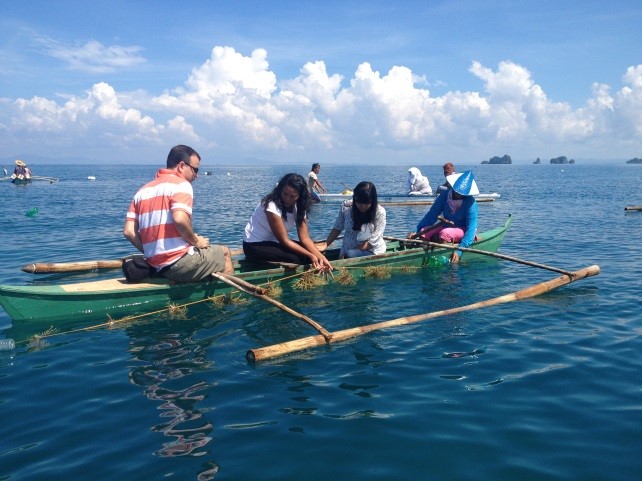
The Seaweed and Bangus Culture for Rural Households in Typhoon Yolanda-affected areas in Western Samar is a project implemented by the Partnership for Development Assistance in the Philippines from March 2014 to December 2015 in partnership with Assisi Development Foundation Inc. (ADFI) through Tabang Visayas which aimed to accelerate the economic recovery of the targeted fisher folk-households in the municipalities of Basey and Marabut through the a) provision of seaweeds and bangus/fish processing inputs; b) conduct of capacity building interventions; and, c) establishing market access.
Enhancing Coastal Communities’ Recovery and Resiliency from Disaster through Seaweeds Farming share
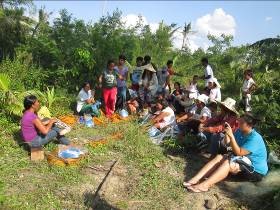 The Enhancing Coastal Communities’ Recovery and Resiliency from Disaster through Seaweeds Farming Project is a one-year projetc (February 2015 to January 2016) implemented by the Partnership for Development Assistance in the Philippines Inc. (PDAP) in partnership with the Overseas Missionary Fellowship (OMF) International, Philippines through its Serving Affected Families Effectively (SAFE) program. The project sought to revive the seaweeds industry in Marabut, Western Samar by increasing production through a) provision of production inputs; b) provision of technical assistance through direct coaching and mentoring and on-site technical advisories; and, c) expansion of production areas to cover the four (4) barangays (i.e. Logero, Binocyahan, Pinalangga and Amambucale) in the municipality of Marabut that passed the water sampling and where OMF-SAFE has an on-going rehabilitation project.
The Enhancing Coastal Communities’ Recovery and Resiliency from Disaster through Seaweeds Farming Project is a one-year projetc (February 2015 to January 2016) implemented by the Partnership for Development Assistance in the Philippines Inc. (PDAP) in partnership with the Overseas Missionary Fellowship (OMF) International, Philippines through its Serving Affected Families Effectively (SAFE) program. The project sought to revive the seaweeds industry in Marabut, Western Samar by increasing production through a) provision of production inputs; b) provision of technical assistance through direct coaching and mentoring and on-site technical advisories; and, c) expansion of production areas to cover the four (4) barangays (i.e. Logero, Binocyahan, Pinalangga and Amambucale) in the municipality of Marabut that passed the water sampling and where OMF-SAFE has an on-going rehabilitation project.
PRODUCTS AND SERVICES share
Project Management and Development
PDAP adopts a two-pronged approach in the promotion and delivery of its services: (a) focusing on donors as a target market; and (b) focusing on stable/sustainable collective enterprises as another target market. In the first approach, PDAP packages a proposal that addresses the preferences and priorities of development investors in terms of geographic areas, subsectors and target populations. In the second approach, PDAP directly identifies clienteles (i.e. stable/sustainable collective enterprises) and designs services that will help and strengthen the enterprises themselves as well as the members of the enterprises.
Value Chain Financing
Value Chain Financing for Collective Rural Social Enterprises (CRSEs) is a financing window for micro, small and medium social enterprises that are into sustainable agriculture and/or agribusinesses preferably in Organic Rice, Muscovado Sugar, Seaweeds, Coffee or Coco-sugar.
Collective Rural Social Enterprises (CRSEs) are organizations:
- owned or controlled by the marginalized sectors (i.e. poverty groups);
- organized for profit;
- managed in a financially-sustainable and socially-responsible manner; and,
- engaged in the processing or marketing of products/goods using sustainable technologies.
| LOANS | GUARANTY | EQUITY | ||
| RETAIL | WHOLESALE | |||
| General Description | Loans extended directly to CRSEs | Loans extended to CRSEs through eligible partner organizations engaged in financial intermediation | Financial guarantee of eligible loans extended to CRSEs by eligible partner organizations | Investments in eligible CRSEs in exchange for partial ownership and control |
| Eligible Enterprises/ Organizations | CooperativesFor-profit corporations (social enterprises) | CooperativesNGOs | CooperativesNGOs | For-profit corporations (social enterprises) |
| Priority Industries/ Sub-industries | Organic RiceMuscovado Sugar
Seaweeds Coffee Coco-sugar |
Organic RiceMuscovado Sugar
Seaweeds Coffee Coco-sugar |
Organic RiceMuscovado Sugar
Seaweeds Coffee Coco-sugar |
Organic RiceMuscovado Sugar
Seaweeds Coffee Coco-sugar |
For further details or inquiries, kindly email us at pdap@pdap.net/ info@pdap.net.
Training and Consultancy
The training and consultancy objective is to enhance the competitiveness of a particular commodity in a particular community. The training and consultancy approach that PDAP offers to a client is based on the value chain analysis of the particular commodity. Among other tools, the value chain analysis helps PDAP and its client to identify the gaps along the value chain that needs to be addressed.
| TRAINING | CONSULTANCY | |
|
Training & Consultancy services |
1. Farming Techniques (Biodynamic, Organic Farming, Natural Farming)
2. Farm Production Planning 3. Internal Control System for Smallholder Groups 4. Post-harvest management techniques, processing, & marketing 5. Livelihood trainings for specific value-added activities under a commodity 6. Financial Management 7. Learning Visits (hands-on training) 8. Industry Clustering 9. Strategic Planning 10. Business Planning |
1. Installation of Internal Control System for smallholder groups
2. Enterprise & Organizational Capacity Enhancement (using PCI as a rating tool) 3. Business Plan Development 4. Financial Management advising 5. Development of LGU/ Commodity-specific master plans 6. Value Chain Analysis (study) 7. Market Research 8. Cluster Development 9. Results-Based Management (RBM) project management 10.Community Organizing
|
| Target Clients | 1. Community Rural Social Enterprises
2. Local Government Units 3. National Government Agencies 4. NGOs 5. Donors |
1. Community Rural Social Enterprises
2. Local Government Units 3. National Government Agencies 4. NGOs 5. Donors |
| Focus Commodities | 1. Organic Rice
2. Muscovado Sugar 3. Seaweeds 4. Coffee 5. Coco Sugar |
|
For further details or inquiries, kindly email us at pdap@pdap.net/ info@pdap.net.
PRIME Program share
The Promoting Rural Industries and Market Enhancement (PRIME, 2005-2011) was a Cad$6.8 million six-year project with Cad$4.8M grant provided by the Canadian International Development Agency (CIDA). PRIME’s expected impact was to reduce poverty in targeted rural areas; this was to be achieved by supporting the development of rural enterprises within the organic and natural products sector (e.g., organic rice, organic muscovado sugar, and seaweeds) resulting in the enhancement of food security, increased household income and generation of jobs and employment for both men and women.
PRIME had four components a) Micro-enterprise Development, b) Enhancing Participation in the Market, c) Program and Policy Analyses in Support of Rural Micro-Enterprises/Industries, and d) Strengthened Institutional Capacity of PDAP.
The main beneficiaries of PDAP’s programs were the rural poor communities composed of farmers, small seaweed farmers, women groups, indigenous communities and other vulnerable sectors in the communities. In PRIME, PDAP sharpened its focus by working with rural enterprising communities (RECs). These RECs were communities who had indications of entrepreneurial capacities and ventured into micro-enterprises. These RECs consisted of farmer associations, agrarian reform beneficiaries (ARBs) and cooperatives.
In the PRIME Program, PDAP implemented various interventions such as capacity building which include training, technical assistance, mentoring, and coaching on enterprise and organizational management; providing access to finance through guaranties, loans and equity participation; facilitation of market linkages; and, policy support and advocacy to enhance partners’ participation in the market. These interventions allowed it to work simultaneously at various levels – directly with rural producers and their households, with their associations, with the supply and value chains, with clusters, with local government units, with industry associations and national government agencies.
PRIME resulted in the increase in income of the farmer members, both men and women, of the 42 Micro Enterprises (MEs) assisted, created more jobs and contributed to food security. The 42 MEs have established viable rural micro-enterprises. MEs with industry potentials were scaled up and connected with the market through appropriate market-participation mechanisms. Industry-specific and gender equitable policy reform initiatives developed and directed towards relevant government agencies (national and local) that regulate and assist rural enterprises/industries. It enhanced PDAP organizational capacity leading towards its long-term institutional sustainability.
CFCD Program share
The Child Focused Community Development (CFCD) Program is a one – year program by PDAP in partnership with Kindernothilfe (KnH) in Sibutu Island. The target beneficiaries of this program were the mothers, children and the communities in Sibutu Island, Tawi – Tawi.
Through the CFCD Program, communities were organized into Self – Help Groups (SHeGs). These SHeGs were strengthened through the conduct of trainings and activities which taught them to plan and implement projects; capital build up through savings; and encouraged them to link with other service providers such as the LGUs. Cluster Level Associations (CLA) were also formed to ensure the sustainability of their development through self-help.
The program also helped develop and strengthen the linkages with the Local Government Unit (LGU) of Sibutu and other project stakeholders which will later on served as partners of the SHeGs in implementing different projects that addressed the issues and concerns of the communities, most especially in terms of social services.
SEAWEED Project share
The Seaweeds Enterprise Action Working for Empowerment and Economic Development (SEAWEED) Project is a three year project (March 2011 to August 31, 2014) implemented in the Caraga region in partnership with Fundacion CODESPA and funded by Agencia Española de Cooperacion International para el Desarollo (AECID). The project was a replication of a project in Sitangkai under the PRIME Program. It aimed to scale-up the seaweed industry in the Caraga region through the adoption of new seaweed farming technology, strengthening of the seaweed farmers’ organizations, and linking the seaweed farmers to the market and financial institutions.
The main beneficiaries of the SEAWEED project are 18 seaweed farmer associations in the provinces of Surigao del Sur and Surigao del Norte. PDAP provided business development services to the PO partners. These included capacity development interventions such as training, technical assistance, mentoring, and coaching on enterprise and organizational management, seaweed technology improvement, providing access to financial institutions, facilitating market linkages, and policy support and advocacy.
The SEAWEED Project contributed to pro-poor growth in the Caraga region particularly in Surigao del Sur and Surigao del Norte. The project increased the income of seaweed farmers while providing employment opportunities to both men and women as a result of the interventions intended to increase productivity and enhance the marketability/competitiveness of the seaweed products. The project resulted in (a) improved seaweeds industry with access to stable markets; (b) economically viable and sustainable seaweed farmers associations; and, (c) increased household income through value-adding products.
Success Stories:
Typhoon Yolanda Rehabilitation Projects share
- Enhancing Coastal Communities’ Recovery and Resiliency from Disaster through Seaweeds Farming
 The Enhancing Coastal Communities’ Recovery and Resiliency from Disaster through Seaweeds Farming Project is a one-year project (February 2015 to 2016) funded by the Overseas Missionary Fellowship (OMF) International Philippines through the Serving Affected Families Effectively (SAFE) which aims to revive the seaweeds industry in Marabut, Western Samar by increasing production. Specifically, it aims to: a) Expand the production areas to cover the 4 barangays in the Municipality of Marabut that passed the water
The Enhancing Coastal Communities’ Recovery and Resiliency from Disaster through Seaweeds Farming Project is a one-year project (February 2015 to 2016) funded by the Overseas Missionary Fellowship (OMF) International Philippines through the Serving Affected Families Effectively (SAFE) which aims to revive the seaweeds industry in Marabut, Western Samar by increasing production. Specifically, it aims to: a) Expand the production areas to cover the 4 barangays in the Municipality of Marabut that passed the water
sampling and where SAFE has an on-going rehabilitation project; b) Provide production inputs to farmer beneficiaries; and, c) Provide technical assistance to farmer beneficiaries through direct coaching and mentoring and on-site technical advisories.
- Seaweed and Bangus Culture for Rural Households in Typhoon Yolanda-affected areas in Western Samar
 The Seaweed and Bangus Culture for Rural Households in Typhoon Yolanda-affected areas in Western Samar is an on-going project in partnership with Assisi Development Foundation Inc. (ADFI) through Tabang Visayas which aims to accelerate the economic recovery of the targeted fisher folk-households in the municipalities of Basey and Marabut through the a) provision of seaweeds and bangus/fish processing inputs; b) conduct of capacity building interventions; and, c) establishing market access.
The Seaweed and Bangus Culture for Rural Households in Typhoon Yolanda-affected areas in Western Samar is an on-going project in partnership with Assisi Development Foundation Inc. (ADFI) through Tabang Visayas which aims to accelerate the economic recovery of the targeted fisher folk-households in the municipalities of Basey and Marabut through the a) provision of seaweeds and bangus/fish processing inputs; b) conduct of capacity building interventions; and, c) establishing market access.
A total of 58 seaweed farmers (38 in Marabut and 20 in Basey) and 60 fisherfolk’s housewives engaged in fish processing (30 in Marabut and 30 in Basey) were targeted as main beneficiaries of the project. Through the US$1,100 donation to PDAP from two US individuals through the First Church of Christ Scientist Manila, six (6) seaweed farmers from Marabut were added as project beneficiaries.
Main project interventions are: a) provision of seaweeds and fish processing inputs; and, b) conduct of capability building interventions such as trainings on seaweeds farming and fish processing (including value-adding skills training), coaching/ mentoring on social enterprise development and facilitating market linkages.
PO Partners Commit in Seaweed Nursery Project share
Farmers from the 18 PO Partners have shown their commitment in the seaweed nursery project in Surigao del Norte and Surigao del Sur. Upon the release of funds from Fundacion CODESPA on the 2nd week of April, farmers started working on the establishment of eight (8) seaweed nurseries in the towns of San Benito, Dapa, Lianga and Barabo.
Members of the San Carlos and New Uba Aquamarine Assn.
with the newly delivered nursery materials
The seaweed nurseries will be established in specifically defined location to ensure year round production of seaweeds. Each nursery will have 5m x 10m working area which will serve as a support structure for farmers especially during planting, tilling and drying. This will also serve as their guard or shed house. There will also be a minimum of 50m x 80m planting area per nursery which will be jointly managed by the POs themselves. These nurseries are expected to be completed on the 2nd week of May 2012.
Seaweeds Nursery Updates - Surigao del Norte share
Seaweeds Nursery Project in Brgy Montserrat, Dapa
This working area in Brgy Montserrat, Dapa is halfway done with lumber materials still lacking. The materials are expected to be delivered on the 19th of May, 2012.
Frames for the seaweed nursery had already been set – up by the Montserrat Seaweeds Farmers Assn (MONSEFA); however, cultivar lines are not yet in place. The whole structure is expected to be completed within the month of May 2012, including the partial planting of cultivars.
Seaweeds Nursery Project in Brgy. San Carlos, Dapa
As of the last week of April, the working area in Brgy. San Carlos, Dapa had been partially completed by members of the San Carlos and New Uba Aquamarine Assn (SCNUAA). The whole facility is expected to be completed within the month of May 2012, including the initial planting of seedlings.
Seaweeds Nursery Project in Sitio Capinggon, Brgy. Maribojoc, San Benito
This photo of the on – going construction of the working area in Sitio Campingganon, Brgy. Maribojoc, San Benito was taken during the 3rd week of April 2012. As of May 18, it is almost complete, with guard house and flooring already installed. The frame for the seaweeds nursery is yet to be established on the 21st of May, 2012. Target date of completion for the whole nursery structure is also within this month.


